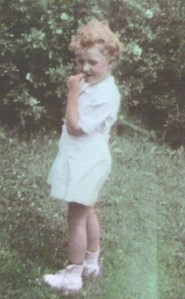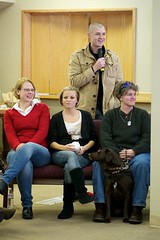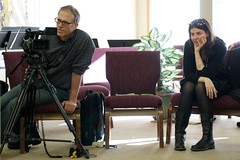 |
| Deborah Feldman |
In an article by Sarah B. Weir, she tells how Deborah Feldman was raised in a Hasidic Jewish community. She was forced to wear skirts that covered her ankles and high-necked blouses that were made of woven fabrics so they wouldn't cling to her body and reveal her shape. She couldn't read books in the English language because her guardian grandfather told her they were written in an "impure language."
She was sexually abused when she was twelve. She never told anyone about the assault because she had been raised with the idea that men's lust wasn't governable. I guess this meant that men had to be satisfied whatever the cost. I am so indignant and appalled at even hearing such a thought expressed. How could anyone teach a beautiful young girl that she had to submit to a man's sexual desires just because she had the necessary equipment to satisfy him. What a travesty! When are women and young girls ever going to be treated with the dignity, appreciation, support, respect, and love that they deserve? Oh, yes, men's ungovernable lust was also the reason her community was segregated by gender
Look at the face of this beautiful young lady and how could anyone measure her worth less than a man's just because she is female? How could anyone subject her to some of the most heinous crimes ever committed against anyone? Going through a sexual assault was so traumatic for me - not just at the moment - but for the rest of my life that I would have preferred death.
But Deborah's story gets worse. At 17, her grandparents forced her into an arranged marriage with a man who was a virtual stranger to her. Sex wasn't a topic in her household, so she had not even the very rudimentary basics of sexual relations and how one gets pregnant. My mother would never say the word "sex", and I can never recall it ever being said while I was growing up. However, I had a girl cousin that filled me in when I was twelve years old.
Looking back, I always thought that was way too old to be learning such things. That was after I had been sexually abused for many years as a child and raped several times the summer I was twelve. Children need and deserve to be taught at a much earlier age. Perhaps it was just easier for us because we had so many multiple births (two sets of twins and a set of triplets in four years - and no, I wasn't taking fertility drugs). I always wanted my children to grow up with a good basic understanding of what happens to their bodies and the human reproduction systems. When we brought our triplets home from the hospital, my four-year-old twin son asked: "How come everybody else only gets one baby and we get two and three?" I wasn't prepared to begin teaching quite so early, but I explained as best I could with analogies. From then on, we talked openly about such things - even at the dinner table - with both sexes there. It was a comfortable subject in our home, and I believe that's the way it should be.
After Deborah's marriage, she had to shave her head and wear a wig. I had heard this was done in orthodox Jewish families and didn't know why, so I looked it up. It seems this tradition is based on a particular verse in the book of Numbers, a part of the Torah or Old Testament. The Wig is to be worn as a head covering because for Jewish women, the uncovered head was from earliest times considered immodest and erotic, if not worse. This covering of the head was so the woman wouldn't draw a man's attention. A woman's hair was only for her husband to see. Also, a woman goes to the mikveh (a small deep immersion pool) for a cleansing ritual that in orthodoxy includes every single hair being submerged simultaneously. It was just easier to shave the head.
Deborah rebelled against wearing the wig and shaving her head after a year of being married. A woman's hair can be one of her most beautiful assets. I imagine having to have a shaved head would be depressing and Deborah said it was for her. I know women who have lost their hair after cancer treatments, and it is worse than the treatments themselves. They can hardly wait until their hair grows back.
Seven years after her marriage, Deborah had the courage to abandon her orthodox life and began a new way of being and living.
So where did Deborah grow up? What country would have such repressive laws against women? Well, is it surprising that she grew up in an ultra-conservative Jewish society right in New York City? My daughter, who lives in New York City, often speaks of seeing these people. They are very obvious by their dress and styles. Now, Sarah Wier notes that the Jewish enclave has passed more laws limiting women. Their women have a curfew and cannot be out on the street after a certain hour. Does this remind anyone of the Nazi laws against the Jews prior to the death camps - especially in the Polish ghetto.
The Jewish community that Deborah grew up in has instituted such extreme laws as a reaction to the atrocities of the Holocaust. Most of the group where Deborah grew up are descendants of Holocaust survivors who fled from Hungary and Romania during World War II. Feldman states: "Hasidic Jews in America eagerly returned to a heritage that had been on the verge of disappearing, donning traditional dress and speaking only in Yiddsh, as their ancesors had done." Part of the reason the emphasis is on family life and reproduction is to replace those who died in the Holocaust and increase their society. Sarah Wier states: " to this day, Hasidic communities continue to grow rapidly, in what is seen as the ultimate revenge against Hitler."
Deborah has written a book about her repressive childhood, being assaulted, and eventually finding the courage to leave it all behind. The title is: "Unorthodox: The Scandalous Rejection of My Hasidic Roots."
Deborah tells about a typical perpetrator grooming of children. Every day as she went to school, he would be there on a bench, sitting, waiting, and offered her candy. She related the incidents to her grandfather who told her he was an older gentleman and she had to speak to him out of respect. Sounds like some of the brainwashing I received. This was a male authority, and you gave them respect. Also, like some of the polygamist cults, she was told that if she spoke to anyone other than her own group, she might be kidnapped and chopped into pieces. What a horrible way to teach a child. She was instilled with intense fear from the time she was very small.
Her own son's welfare was ultimately what gave her the courage to escape. The religious view was always that "God will protect you." One night while speeding down a highway with a car that had worn tires, she got into an accident and the car overturned three times. In her community, no one made their kids wear seat belts. In pondering this after her accident, she realized if she had taken her son with her, he would have been killed. Deborah had been after he husband to get different tires with no results. When he came to the hospital the night of the accident, she informed him she was through. She was leaving.
A friend from one of her classes at Sarah Lawrence College where she was going part time, took her in. In a history class, studying about memoirs, she began to feel that she just might be able to make a difference and have her voice heard.
Where is Deborah today? She is an outcast with her family, and they write her hate mail and want her to commit suicide. Her husband is no longer as orthodox and they share custody of her five-year-old son.
It's been two years since Deborah made the break, but she's still very wary and doesn't let her address be known. Her book has become her insurance against relatives harming her because they don't want their actions made public.
Deborah has learned about forgiveness which was also huge for me. Instead of blaming others and being angry which is lower vibrational energy, it's so much better to give yourself and others the gift of forgiveness by putting your focus on healing. No matter what has happened to you, when you are an adult, you are responsible for your own healing. Deborah's first inclination was to hold her grandmother personally responsible for all that she went through, but that wouldn't heal her. Forgiveness is truly the path to healing. It's taking that journey from the head into the heart. I salute Deborah for her courage and for owning the power of her voice and for being a survivor!










